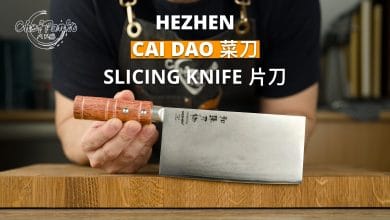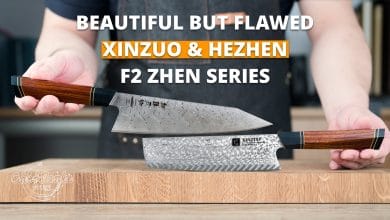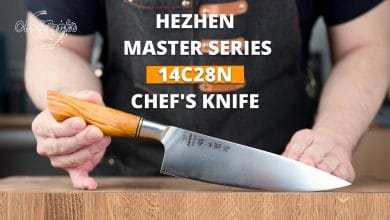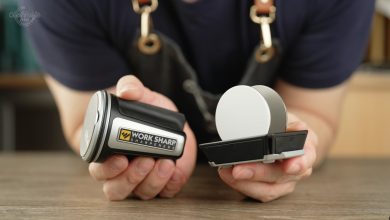Before you buy a CCK Cleaver, you must know that CCK has changed the logo design. The version in this video is the old stamped logo that contains all the information about their shop. It includes the size number, shop location, and phone number, and it is part of the history of Chan Chi Kee.

The new batches for 2021 have been replaced with a new lasered logo instead of stamped. Everything else is the same. So make sure you contact the seller and ask which batch you get before ordering.

Vegetable Cleaver vs. Dual Purpose Cleaver
Chan Chi Kee has many variations and types of knives, the version I’m reviewing in this video is a vegetable cleaver or known as a slicer. It is thinner and lighter and sharpened at a lower angle compared to its dual-purpose Cleaver.

Under: KF1802 (Chopper)
Chan Chi Kee Choil and Slicing Performance (KF1912)
The Choil on the Chan Chi Kee is nicely done and thin behind the edge. The knife will go smoothly through root vegetables without splitting them.

The taper at the Choil is slightly thicker than the front taper of this knife. But the difference is very minimal and barely noticeable. Therefore the performance is pretty much the same across the blade.
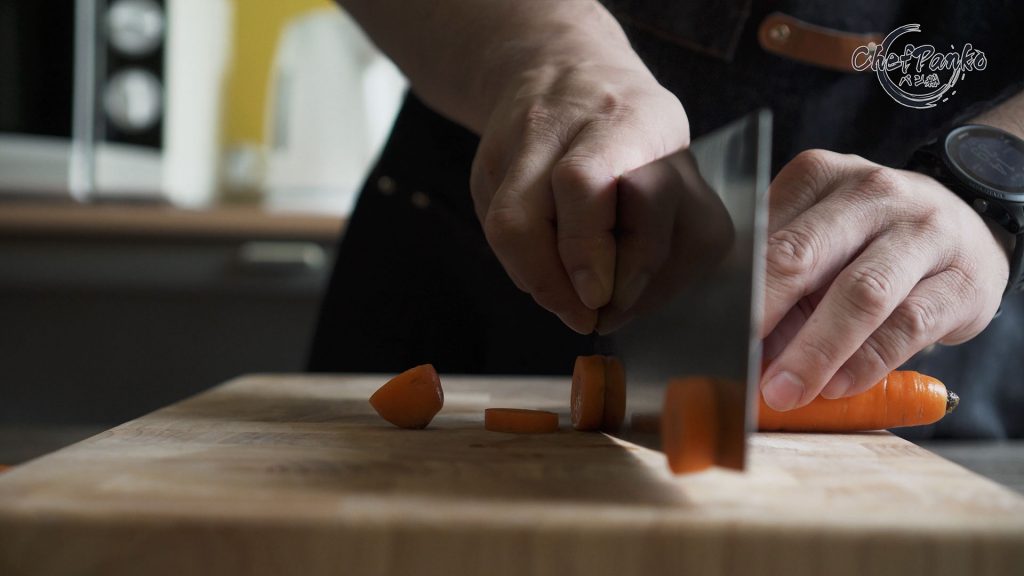
Food Release
Food with high water content will stick to your blade, but there is pretty much no resistance while slicing through food with high water content. Over time the food release will be better since you will build natural scratch patterns on the blade. Another option is to add scratch patterns with some sandpaper or whetstone.
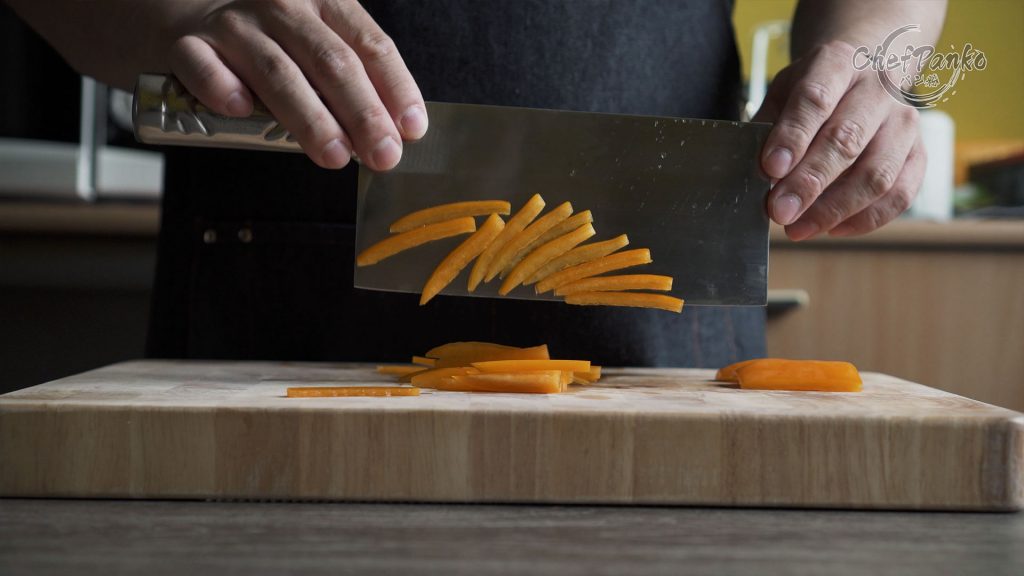
Edge durability & sharpened angle
The knife is sharpened at a 20-degree angle per side. The blade has durable stainless steel, so you don’t have to worry about chipping.

Edge retention
CCK has no information about the Rockwell hardness. However, during my testing, the knife feels like a Rockwell of around 58 or slightly higher. Combined with the knife’s 20 degrees sharpened angle, the knife edge can last approximately four to five months with regular honing sessions before needing whetstone maintenance.

Weight and Spine tapering
The knife comes with a weight of 270grams, which is surprisingly light for a Chinese cleaver with a stainless steel handle. There is no distal spine taper which is typical for a Chinese cleaver. The thickness across the spine is 1.6mm.
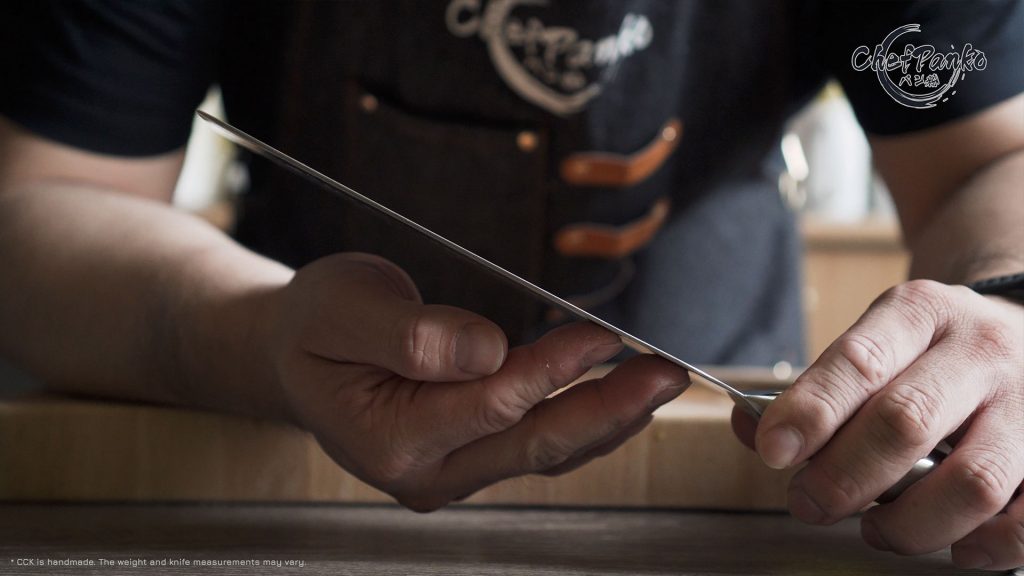
Knife handle
The Chan Chi Kee KF1812 has a hollow stainless steel handle that is welded on the blade. The handle is comfortable to hold and is suitable for small to large hand sizes, and the added grooves provide extra grip. they also have added Chinese characters on the handle. The right side says Chan Chi Kee, and the other side translates to Stainless steel. Keep in mind that the stainless steel handle will be slippery for those that can’t keep their knife hand dry or have sweaty hands.

Knife balance point
The balance point of this knife is at the front, which assists you in the up and down motion.

Blade profile
The blade profile is on the flat side, but the heel and the front have a slight curve to prevent you from digging into your cutting board. The curves also give you the ability to rock on herbs.
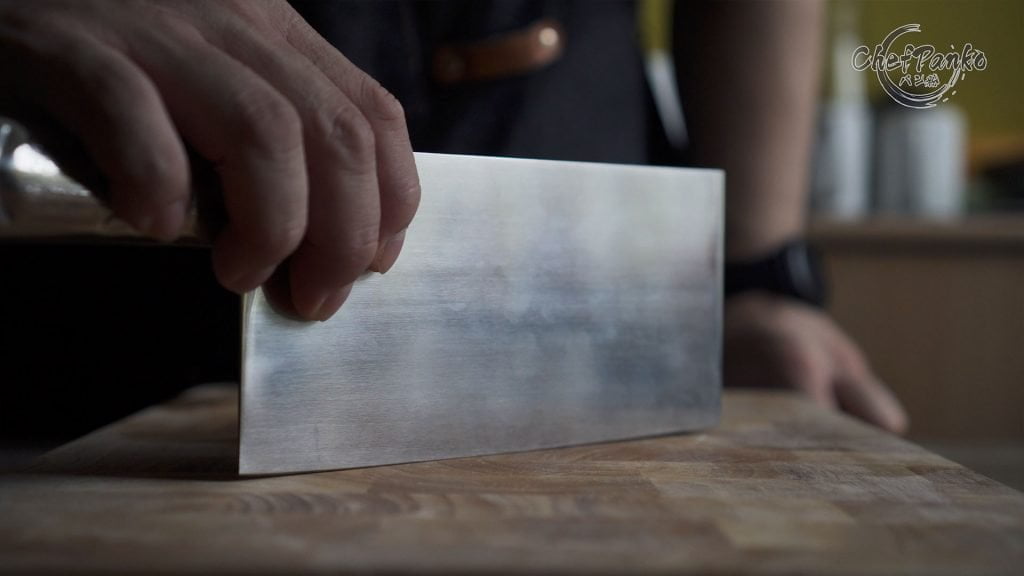
Conclusion and recommendation
The Chan Chi Kee KF1812 is an excellent vegetable cleaver, especially if you like a straight blade profile. Stainless steel is also quite durable. It is one of the lightest vegetable cleavers that includes a stainless steel handle. The handle is comfortable to hold, and the grooves add extra grip. However, for those who can’t keep their knife hand dry or have sweaty hands, the stainless handle will be pretty slippery. A wooden handle will be better in that scenario. Unfortunately, the online prices are very steep, and you will be paying a premium.

🛒S H O P:
I highly recommend buying from your local Asian supermarket as they tend to be a lot cheaper there than ordering online.
Knives used in this article:
Chan Chi Kee NO.2 (CCK)
KF1812 (Vegetable Cleaver, Slicer)
KF1802 (Chopper)
Measurements*:
Length: 20.5cm
Width: 9cm
Thickness: 1.6mm
Weight: 270grams
Steel-Type: Stainless
Handle: Hidden full tang wooden handle
Logo: Old stamped logo (2021 version has been replaced with a lasered one)
▶ If you want to know what knife you should buy you can read the following article ''Choosing your knife''. ▶ On my youtube channel, I have reviewed a lot of different knives. You can watch the playlist by clicking here. ▶ Click here, if you want to search for other kitchen knives on: Amazon. ▶ , if you want to search for other Chinese knives on . ▶ Check out my gear on Kit: https://kit.co/ChefPanko ▶ Check out my recommendation on Amazon: https://www.amazon.com/shop/chefpanko Full Disclosure: If you purchase from these links I get a small commission that goes towards supporting the channel and website. As an Amazon Associate, I earn from qualifying purchases ▶ If you have any questions about Japanese knives made in China or about some of the brands feel free to ask it in the comment section below. Thank you for your support and feedback. ▶ Want to work with me? Please use the contact form by clicking here.

